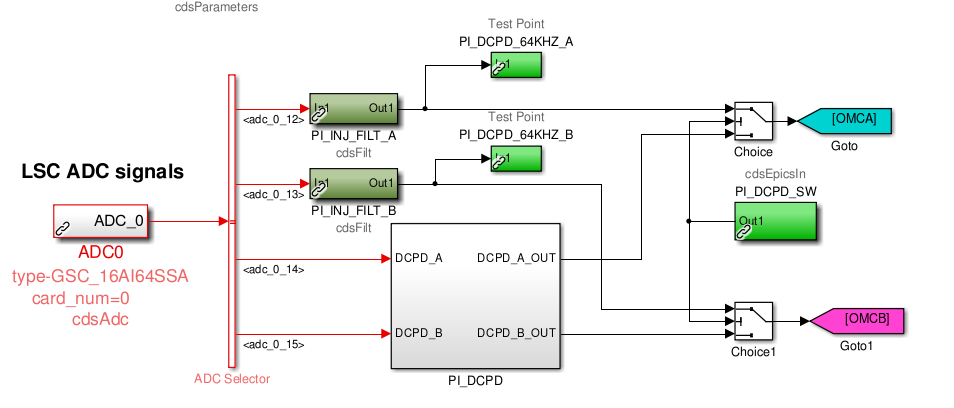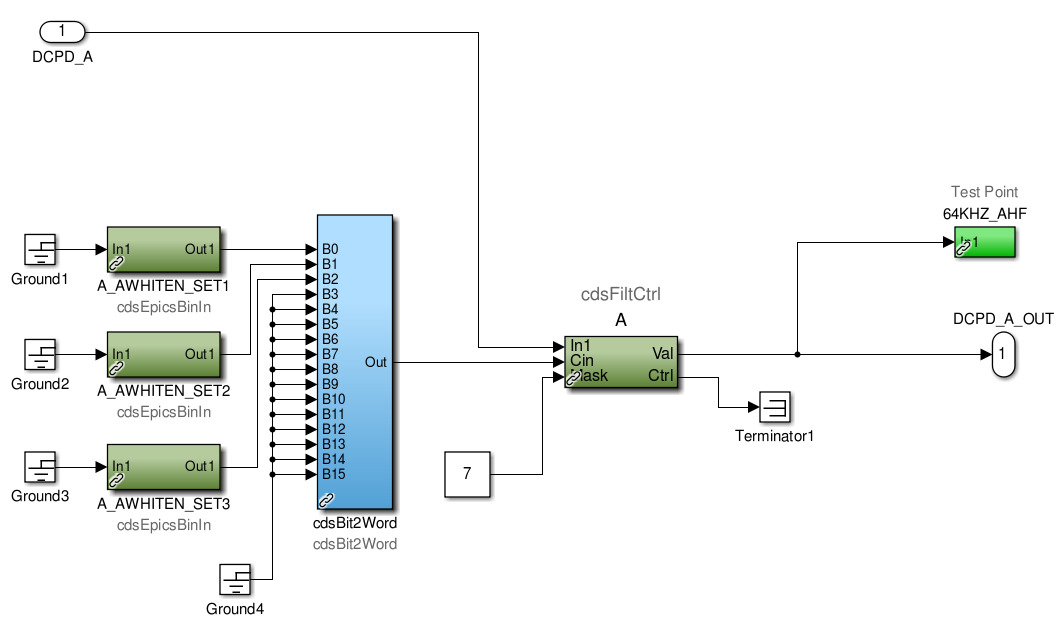Daniel, Ross, Carl, Kiwamu,
WP#: 5957
We made two modifications on the h1omspi, h1susetmxpi and h1susetmypi models as follows.
-
We added all the I and Q down sampled channels to science frame at 2 kHz.
-
We added two new OMC DCPD signals which don't get attenuated by two 10 kHz poles of the whitening circuits.
We are ready for tomorrow's model restart during the maintenance period.
[I and Q signals to science frame]
Since all the I and Q down sampled signals have been already recorded in commissioning frame, we just added a star symbol to each channel name in the DQ text field in the simulink models. In total, 24 channels (8 channels from each model) will newly go to science frame at 2 kHz.
[New DCPD signals]
We decided to do a quick hack on the OMC whitening board so that we don't suffer from the two 10 kHz poles (technically, 14 and 18 kHz from the differential receiver stage, see alog 21131) to obtain a better signal to noise ratio. Some more details of this quick hack will be reported by Daniel and Stefan later. In the mean time, we have edited the h1omcpi model so that it is capable of handling these two signals. In the first attachment it shows the two new ADC inputs (adc_0_14 and adc_0_15) which then go to a subblock called PI_DCPD. One can choose whether the normal DCPD is used for the PI error signal or the new signals by the two choice blocks that are behind the PI_DCPD block.

Once we become able to damp the PI modes using the new DCPD signals, we should get rid of the old DCPD signals. But for commissioning purpose, we are leaving the normal DCPDs available for now.
Also, we added these two new signals to commissioning frame at the full sampling rate at 64 kHz. So, in total, we now have four 64 kHz DQ channels, which should be reduced to 2 or 1 channels as we complete the commissioning at some point in future. The new DQ channels have the names as PI_DCPD_64KHZ_A(B)HF. Note that in order to save the test points for the normal DCPD signals, we pulled them out of a subblock and placed them at the top level as seen in the first attachment.
In the PI_DCPD subblock, we have placed controlled-IIR-fitlers so that they can be synchronized with the analog board settings as have been done in the LSC and ASC models. See the second attachment.

All the changes are checked into the SVN repo. We made sure that they compiled without errrors.















Plot 1: Noise spectrum for tonight. Below 60Hz is due to ASC, and can still be addressed.
Plot 2: Auxiliary loops noise. Note the increased coupling of the mechanical resonances just below 60Hz. I suspect that we still are not quite centered in the recycling cavity.
Plot 3: Aux loop coherences
After this lock broke Carl and I turned on the ITM ring heaters to 0.5 Watts each, and left the end stations at 1.5 Watts each. Carl thinks that this will help with PI, and this will also set us up to try some common TCS tuning tomorow.
Some of the things that Lisa mentioned are now in the guardian.
Attached is a screenshot of when (in PSL power terms) the OMC ASC rails.
For the first almost 3 hours of this lock we were toggling the gain of CSOFT P by 20 dB every 10 seconds because of a logic problem in the guardian. Should be fixed now.
Filters for PI damping have been broadened to 10Hz as the phase change over 0.5Hz for some of the filters being used was greater than 200 degrees.
These 10Hz wide filters may be problematic for the 15541.9 and 15542.6Hz modes. I have tested damping these modes at low amplitudes with the 10Hz wide filters and to damp, however as we reached 3 hours into this lock the 15541.9 and 15542.6 were slowly pushing their way up, the filters I have put in have about 60 degrees phase shift for 1Hz change in frequency.
I tested iwave on this pair of modes, it tracks the largest mode very well, however once damped to a level lower than the next highest mode it runs off and tracks that mode. This meant two iwave blocks running one on each etm pi model generally pushed their test mass with the largest amplitude mode. I was using tau of 10.
We have a SUS_PI guardian now. The gaurdian has 4 states managed by ISC_LOCK. IFO_DOWN, OMC_TRACKING, PI_DAMPING and ETMX_PI_DAMPING. The tracking state just turns on tracking for long term testing. The damping states turn on the bandpass damping chains with settings that have been tested today and very low gains for the settings in Terra's PI wiki. I will update the wiki tomorrow with some new settings.
The 0.5W increase in the ITM ring heaters should push the optical mode to lower frequencies, as we see PI in the 15540Hz group of modes close to the end of the RoC thermal transient (1.5-2hour in a 2-3hour transient) I am hoping this will be enough to make these instabilites a little less agressive. I have been doing some testing of the 15kHz mode in anticipation that this TCS change will make these modes ring up more at the beginning of lock.
Before leaving I stepped the ETMY Ring heater by 0.5W total to test the idea that we can push the 15542Hz modes appart with a little heating.
The ITM ring heaters that Sheila activated seemed to have introduced a substrate lensing of about 8 uD on each optic according to the TCS simulator. The ITMX HWS saw the consistent amount of change in the substrate lensing (~ 18 uD due to the round trip lensing which gives an extra factor of two). After the ring heaters were activated, the power recycling on average was higher than the previous 41 W stretch by 1%; this could be because the last lock stretch with the ring heaters was with a slightly lower PSL power of 39 W. I attach trend of the relevant channels.